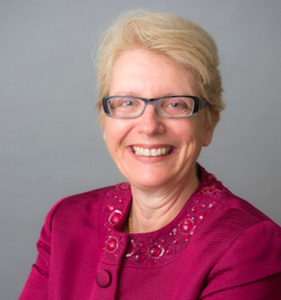
Chair of the Department of Human Science Rosemary Sokas has been selected to lead the board of directors of the Migrant Clinicians Network.
Chair of the Department of Human Science in the School of Nursing and Health Studies Rosemary Sokas was appointed to a leadership position on the board of the Migrant Clinicians Network over the summer.
MCN is a global organization that aims to improve health care for migrants around the world by providing support, technical assistance and professional development to clinicians in Federally Qualified Health Centers and other health care delivery sites.
The group consists of over 10,000 constituents who perform research, advocate for migrants and engage external partners for support.
Sokas said that she became passionate about immigrant workers through the experiences of her own family.
“My one grandfather, who died before I was born, never learned English and worked as a dishwasher, which is a mostly immigrant job to this day,” Sokas wrote in an email to The Hoya. “My other grandfather, whose own father was an immigrant laborer, was my buddy growing up. He worked a drop-forge press and lost his hearing from the noise, which got me interested in occupational health.”
After developing an interest in occupational health, Sokas worked in a seasonal and migrant agricultural health center, where she interacted with agricultural and construction workers, many of whom were immigrants.
Sokas said that she hopes to help practicing clinicians through her work in MCN.
“As an academic, what I do is so much easier than primary care clinical medicine,” Sokas wrote. “I wanted to help make practice easier for the clinicians who are caring for patients directly, which is what MCN does.”
Sokas said that she was drawn to MCN by a number of its outreach programs, including one that monitors patients with active tuberculosis to ensure that they are treated, even if they face deportation.
“They provide technical support, and they try to help with really thorny issues … which the treating clinician simply doesn’t have the time to do,” Sokas wrote.
Sokas has previously integrated MCN into her courses, giving students the chance to learn about environmental issues in a real-life context.
In an environmental justice course she co-taught with Professor Laura Anderko, Sokas brought her students to the MCN office in Salisbury, Md. and a camp where the workers stayed.
In another course, Sokas gave students an opportunity to work on MCN’s projects. In her toxicology class, Sokas asked students to help review the Environmental Protection Agency’s updated Worker Protection Standard to evaluate how well it protects farmworkers from pesticide exposure.
“In the current WPS, there is no age limit for pesticide handling, so you could have a 14-year-old doing that. We’re trying to see a minimum age of 18 implemented,” Sokas wrote.
In her new position, Sokas will continue working on a number of different projects to solve the challenges that health centers face in trying to meet the occupational health needs of their patients.
In addition to her work outside of Georgetown, Sokas was praised by students and colleagues in the NHS as an inspirational and helpful professor.
NHS Dean Patricia Cloonan praised Sokas for her work, which she said aligned with the vision of the school.
“I congratulate Rosie on being selected for this new voluntary leadership role, a professional honor that highlights her steadfast commitment to the health and well-being of the migrant community,” Cloonan wrote in an email to The Hoya. “Her work embodies this school’s mission, vision and values, which frame our collective organizational efforts to promote health equity and eliminate health disparities.”
Katherine Foley (SFS ’14) said that Sokas was a very helpful professor who accommodated her needs.
“She’s very knowledgable, but also very practical, and is very good at sizing up a situation and deciding what is ‘good science,’” Foley said.
“She was totally encouraging when I had a million questions, and she never made me feel stupid even though I was the only non-nursing student in the class. She’s a tough cookie, but also genuinely caring, respectful and just really encouraging.”




















